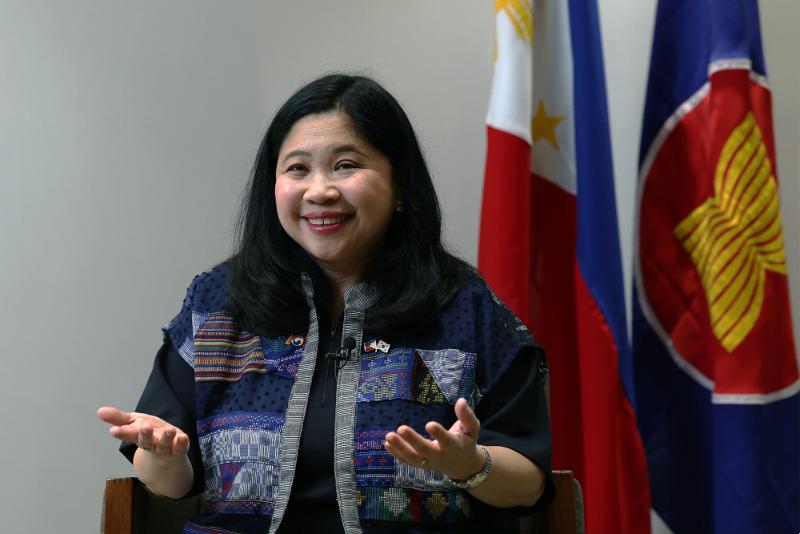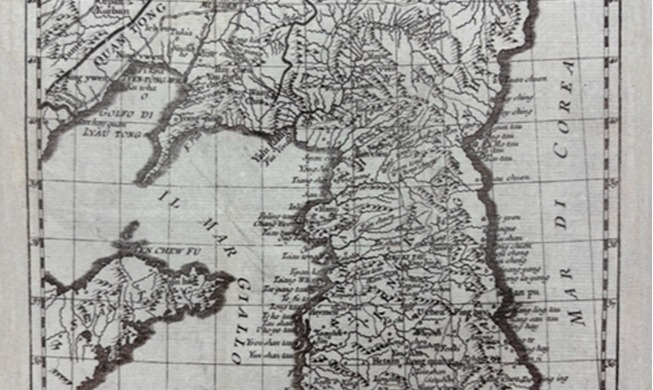- 한국어
- English
- 日本語
- 中文
- العربية
- Español
- Français
- Deutsch
- Pусский
- Tiếng Việt
- Indonesian

Philippine Ambassador to Korea Maria Theresa B. Dizon-De Vega on Oct. 22 explains the development of bilateral relations in an interview with Korea.net at her embassy in Seoul's Yongsan-gu District. (Lee Jun Young)
By Yoon Sojung and Margareth Theresia
Video = Lee Jun Young and Park Daejin
"Shared sacrifice and a long history of connection and friendship."
These are what Philippine Ambassador to Korea Maria Theresa B. Dizon-De Vega calls the keys to the deep ties between Korea and the Philippines, as both sides this year mark the 75th anniversary of bilateral relations.
The ambassador said, "The friendship based on the shared sacrifice of a blood alliance was built during the Korean War, when both countries fought shoulder to shoulder for peace on the Korean Peninsula. And this is now evolving into a new future-oriented partnership."
On robust human exchange as exemplified by Korea sending the most tourists to the Philippines, she added, "This is the best manifestation of the friendship between the people of the two countries."
Ambassador Dizon-De Vega is also a fan of Korean cinema since the early stage of Hallyu (Korean Wave) in the 1990s, expressing her love for Korean culture over the past two decades.
The following are excerpts from an Oct. 22 interview with the ambassador at her embassy in Seoul's Yongsan-gu District.
President Yoon paid a state visit to the Philippines in early October. What does the Philippine government view as the significance and major results of his trip?
President Yoon Suk Yeol's state visit to my country brought meaningful outcomes. We witnessed the elevation of our bilateral relations to that of a strategic partnership. On the sidelines of the visit, both countries signed seven memoranda of understanding (MOU) on cooperation in important fields ranging from energy to critical material development to that between our coast guards and tourism.
In addition, 12 MOUs were signed on cooperation between public companies and private organizations.
Both sides seek to ratify a bilateral free trade agreement (FTA) signed in September last year. What expectations does your government have for the accord?
Korea is one of the Philippines' top 10 trading partners and a very important economic partner for the Association of Southeast Asian Nations (ASEAN). The Korea-Philippine free trade agreement is a forward-looking agreement in that we envision it including economic and technical cooperation in emerging economic fields of engagement such as creative content, knowledge industry, energy, green technology, public health, and electric vehicles or green transportation.
Aside from that, the accord also includes a provision on economic and technical cooperation, which is very important to nurture and to strengthen new industries and sectors like innovation and startups. We signed the FTA almost a year ago and the Philippines has already ratified it. We hope it will be implemented within the year in Korea.
What joint projects are both sides pursuing in the Philippines? In what sectors does your government wish to expand bilateral cooperation?
Among many areas of engagement, I'd like to first highlight infrastructure. The Philippines and Korea are very active infrastructure partners. Our President Ferdinand Marcos Jr has a "build, better, more infrastructure (BBM)" development program to strengthen the connectivity of the Philippines to make transportation, distribution, roads and other networks more seamless.
Korea has played a very significant part in this program like in construction of the Pang Il Bay Bridge, for example. It also plays a very significant role in water development.
Digitalization is another important area of bilateral cooperation. Korea is a pioneer in digital innovation. Both countries can work together toward the digitalization of our judicial systems and other public sector areas to make full use of digital technology in public services.
Another unmissable area is energy. To reduce greenhouse gas emissions and the use of fossil fuels, both countries have strengthened cooperation in renewable energy such as hydro and solar energy. Also, the Philippine Department of Energy and the Korea Hydrogen and Nuclear Power Corp. will jointly conduct a feasibility study on a nuclear facility in the Philippines.
How does Manila evaluate Seoul's efforts to secure peace on the Korean Peninsula and keep it nuclear free?
The Philippines has always advocated democracy and is with the international community in advocating the denuclearization of the Korean Peninsula. We call on all countries to abide by the relevant United Nations Security Council resolutions. We believe that the path toward peace is through dialogue and diplomacy, not the threat of force.
We have regularly issued national statements condemning and showing concern about very aggressive testing that may threaten peace. We support the importance of a rule-based international order.
The Philippines sent the most soldiers by an Asian country during the Korean War. How have both sides continued their blood alliance formed during the conflict?
Relations between the Philippines and Korea have always been firmly anchored by our deep historic ties in shared sacrifices. During the Korean War, we were the first Asian country to send troops to help defend democracy on the Korean Peninsula. So we have a long history of connection, friendship and partnership, and this has grown over seven decades into a more future-oriented partnership.
For improvement in inter-Korean ties and the role of the Philippines in that regard, I hope both Koreas have the opportunity to discuss through dialogue matters that concern them through the platform of ASEAN, namely the ASEAN Regional Forum. We hope that both Koreas continue to use this platform and mechanism to build a pathway to dialogue and communication in resolving issues.
Hallyu is huge in the Philippines. What plan does your government have to raise cultural exchange and tourism with Korea?
Our National Commission for Culture and the Arts and the Korean Ministry of Culture, Sports and Tourism are working on an MOU on cultural cooperation containing an executive program on such cooperation and artist exchange over the next six years. During President Yoon's state visit to the Philippines this month, the culture ministries of both countries signed an MOU on a potential partnership and cooperation in tourism.
Before and after COVID-19, Korea has been the No. 1 country for sending tourists to the Philippines. We attribute this to a long history, our enduring friendship, shared sacrifices during the Korean War and shared values.
Korea is also becoming one of the most popular travel destinations for Filipinos mainly because of Hallyu and Korean content, as well as other aspects of Korean life from K-beauty to K-food. So all these things make for a very active and robust people-to-people engagement. This is the best manifestation of the friendship between the two countries and their people.
Personally, I am a film aficionado who has watched Korean films for over two decades since the early days of the Hallyu in the 1990s. These days, I find pansori (solo lyrical opera) fascinating and am interested in the tea cultivating tradition of Korea. Though maybe too busy to try, I wish to join a kimchi-making festival in November.
